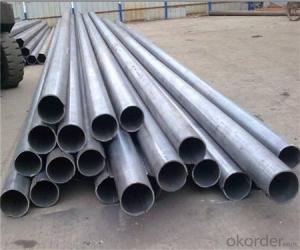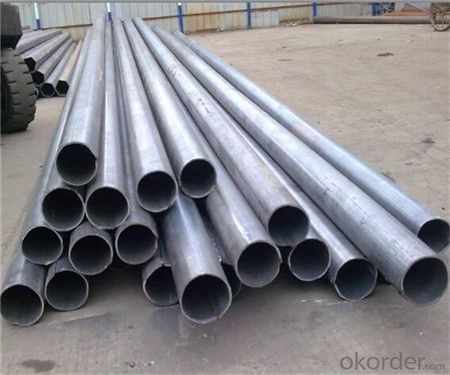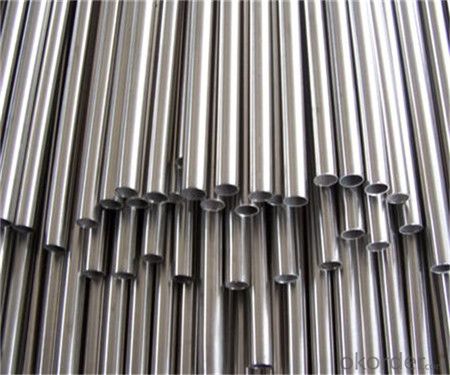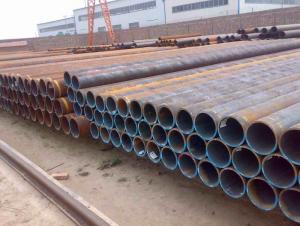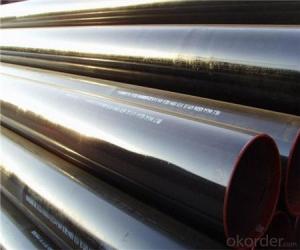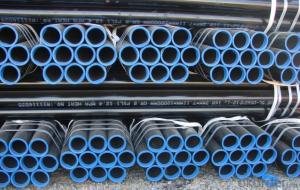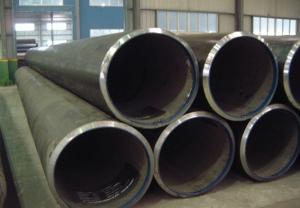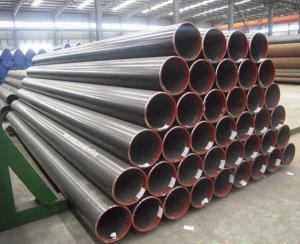Welded Steel Tube/Pipes Electric Resistance Welded (ERW) Steel Pipe
- Loading Port:
- Tianjin
- Payment Terms:
- TT OR LC
- Min Order Qty:
- 30 m.t.
- Supply Capability:
- 9000 m.t./month
OKorder Service Pledge
OKorder Financial Service
You Might Also Like
Product Description:
1、Structure of Welded Steel Tube ASTM DIN1829:
Welded Steel Tube is formed by drawing a solid billet over a piercing rod to create the hollow shell. We are company that have many years experience and professional manager team and engineer team and sales team, sure we will provide you high quality of welded pipe and professioanl service.
2、Main Features of the Seamless Pipe :
• High manufacturing accuracy
• The higher strength
• The small inertia resistance
• Strong heat dissipation ability
• Good visual effect
• Satisfy price
▲ Electric Resistance Welded (ERW) Steel Pipe
▲ Longitudinal Submerged Arc Welded (LSAW) Steel Pipe
▲ Spiral Submerged Arc Welded (SSAW) Steel Pipe
▲ Hollow Section (Square and Rectangle Pipe)
▲ Hot Dipped Galvanized Steel Pipe
3、Seamless Pipe ASTM DIN1829 Specification:
Standard | GB, DIN, ASTM ASTM A106-2006, ASTM A53-2007 |
Grade | 10#-45#, 16Mn 10#, 20#, 45#, 16Mn |
Thickness | 8 - 33 mm |
Section Shape | Round |
Outer Diameter | 133 - 219 mm |
Place of Origin | Shandong, China (Mainland) |
Secondary Or Not | Non-secondary |
Application | Hydraulic Pipe |
Technique | Cold Drawn |
Certification | API |
Surface Treatment | factory state or painted black |
Special Pipe | API Pipe |
Alloy Or Not | Non-alloy |
Length | 5-12M |
Outer Diameter | 21.3-610mm |
Grade | 20#, 45#, Q345, API J55, API K55, API L80, API N80, API P110, A53B |
Standard | ASME, ASTM |
4、Packaging & Delivery
Packaging Details: | seaworthy package,bundles wrapped with strong steel strip |
Delivery Detail: | 15-30days after received 30%TT |
images of products:
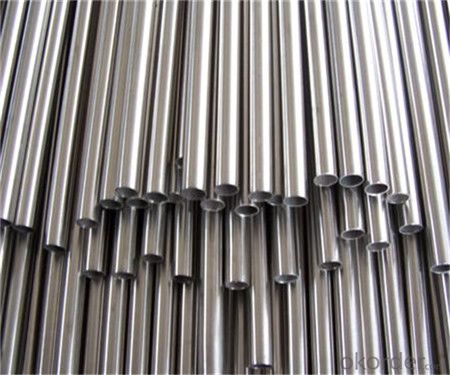
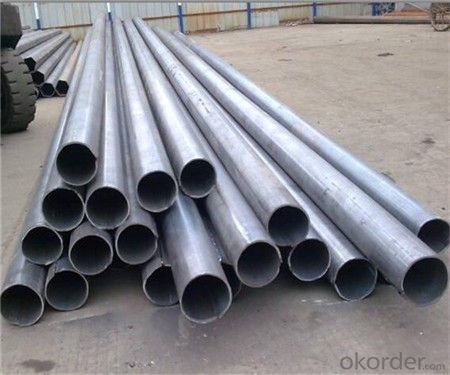
5、 FAQ of Welded Steel Tube Steel Pipes:
①Quality
Our products are manufactured strictly according to national and internaional standard, and before delivered out we always take a test
on every pipe . If necessary we could provide our quality certifications and all kinds of testing report,.
Guaranteed: If products’ quality don’t accord to discription as we give or the promise before you place order, we promise 100% refund.
②Price
we are factory and be able to give you lowest price below market one, and we have a policy that “ for saving time and absolutely honest business attitude, we quote as lowest as possible for any customer, and discount can be given according to quantity”,if you like bargain and factory price is not low enough as you think, just don’t waste your time.Please trust the quotation we would give you, it is professional one.
Why us?
We can provide both low price and good quality especially we are belong to national company could provide you the best sell-after service .Additionally, we can also offer professional products inquiry, products knowledge train(for agents), smooth goods delivery, exellent customer solution proposals.Our service formula: good quality+good price+good service=customer’s trust
Our Advantages:
1) Fast Delivery: lot of high quality steel pipe in stock lot of factory to produce
2) Quality Assured: Strictly acc. To International standard with System ISO certification
3) Good Service: supplied professional technical guide free of charge at anytime;
4) Reasonable Price: to be better support your business;
SGS test is available, customer inspection before shipping is welcome, third party inspection is no problem.
Looking forward to doing the corporation with you
Any question, kindly feel free to contact us !
- Q: What are the safety precautions to follow while working with steel pipes?
- When working with steel pipes, it is important to follow several safety precautions to ensure a safe working environment. These precautions include wearing appropriate personal protective equipment (PPE), such as gloves, steel-toed boots, and safety glasses, to protect against potential hazards. It is also crucial to inspect the pipes for any defects or damage before use to avoid accidents. Additionally, workers should be trained on proper handling and lifting techniques to prevent strains or injuries. Finally, it is essential to establish clear communication and adhere to safety protocols, such as using caution signs and barriers, to promote a safe work area for everyone involved.
- Q: What is the difference between steel pipes and PPR pipes?
- Steel pipes are made of steel and are primarily used for transporting liquids and gases in industries such as oil, gas, and construction. They are durable, resistant to high temperatures and pressure, and have a long lifespan. On the other hand, PPR (polypropylene random copolymer) pipes are made of plastic and are commonly used for plumbing systems in residential and commercial buildings. PPR pipes are lightweight, easy to install, corrosion-resistant, and have good thermal insulation properties. They are more suitable for carrying water and other non-corrosive fluids.
- Q: What is the diameter of the steel tube DN20?
- 1, nominal diameter is nominal diameter, or nominal diameter, or nominal size.2, nominal diameter is a variety of pipe and pipe accessories generic caliber. The same nominal diameter of the tube and pipe accessories can connect with each other, with interchangeability. It is not a real sense of the pipe diameter or diameter, although its value is closer with the pipe diameter or equivalent, is a convenient integer for reference only, are not strict with processing size. Nominal diameter is not the outer diameter, nor the inner diameter, but a nominal size similar to the diameter of the ordinary steel pipe. In order to connect the pipe and pipe fittings in a uniform dimension, each nominal diameter corresponds to an outer diameter, and the inner diameter value varies with the thickness.
- Q: How are steel pipes used in the manufacturing of aerospace components?
- Steel pipes are used in the manufacturing of aerospace components as they provide structural support and durability. They are commonly used for fuel and hydraulic systems, allowing for the safe and efficient transfer of fluids throughout the aircraft. Additionally, steel pipes are utilized in the fabrication of engine components and airframe structures, ensuring strength and reliability in the demanding aerospace environment.
- Q: What are the different manufacturing standards for steel pipes?
- There are several different manufacturing standards for steel pipes, including American Society for Testing and Materials (ASTM), International Organization for Standardization (ISO), and American Petroleum Institute (API). These standards outline the requirements for various aspects of steel pipe manufacturing such as dimensions, material composition, mechanical properties, and testing procedures. Compliance with these standards ensures that steel pipes meet the necessary quality and performance requirements for their intended applications.
- Q: How are steel pipes protected against external damage?
- Steel pipes are protected against external damage through various methods such as coating them with protective materials like polyethylene or epoxy, using cathodic protection techniques, and implementing physical barriers like concrete encasement or pipe sleeves. These measures help prevent corrosion, impact, and abrasion, ensuring the durability and longevity of the steel pipes.
- Q: Can steel pipes be used for underground gas pipelines?
- Yes, steel pipes can be used for underground gas pipelines. Steel pipes are ideal for underground gas pipelines because they are durable, strong, and can withstand the pressure and corrosive elements found underground. Additionally, steel pipes have a long lifespan, are resistant to extreme temperatures, and are relatively easy to install and maintain.
- Q: Can steel pipes be used for chimney flues?
- Yes, steel pipes can be used for chimney flues. Steel pipes are commonly used for chimney flues due to their durability, heat resistance, and ability to withstand high temperatures. They provide a reliable and efficient solution for venting smoke and gases from a fireplace or stove.
- Q: What's the difference between a rectangular tube and a rectangular steel tube?
- The classification of rectangular tube: steel pipe seamless steel pipe and welded steel pipe (tube) hot-rolled seamless tube, seamless tube, seamless tube, welded tube extrusion. The welded square pipe is divided into two parts:(a) according to the process of arc welding - resistance welding tube, square tube (high frequency and low frequency), welding square tube, welding square tube furnace (b) according to the weld - welded square tube, spiral welded pipe.
- Q: How are steel pipes used in the mining industry?
- Steel pipes are commonly used in the mining industry for various purposes such as transporting minerals, water, and gases underground, as well as for constructing mine shafts, tunnels, and mine infrastructure due to their durability, strength, and resistance to corrosion.
Send your message to us
Welded Steel Tube/Pipes Electric Resistance Welded (ERW) Steel Pipe
- Loading Port:
- Tianjin
- Payment Terms:
- TT OR LC
- Min Order Qty:
- 30 m.t.
- Supply Capability:
- 9000 m.t./month
OKorder Service Pledge
OKorder Financial Service
Similar products
Hot products
Hot Searches
Related keywords
